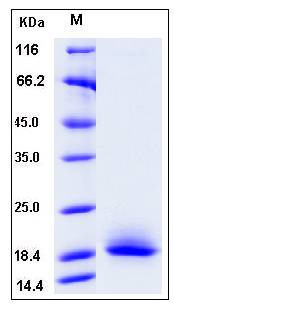Mouse CD59a / Protectin / MAC-IP Protein (His Tag)
AA987121,Cd59,protectin,RP24-297H17.1
- 100ug (NPP2684) Please inquiry
| Catalog Number | P50724-M08H |
|---|---|
| Organism Species | Mouse |
| Host | Human Cells |
| Synonyms | AA987121,Cd59,protectin,RP24-297H17.1 |
| Molecular Weight | The secreted recombinant mouse CD59a comprises 83 amino acids and has a calculated molecular mass of 9.7 kDa. As a result of glycosylation, the recombinant protein migrates as an approximately 18 kDa band in SDS-PAGE under reducing conditions. |
| predicted N | Leu 24 |
| SDS-PAGE |  |
| Purity | > 92 % as determined by SDS-PAGE |
| Protein Construction | A DNA sequence encoding the mouse CD59a (NP_031680.2) (Met 1-Lys 95), without the pro peptide, was fused with a C-terminal polyhistidine tag. |
| Bio-activity | |
| Research Area | |
| Formulation | Lyophilized from sterile PBS, pH 7.4 1. Normally 5 % - 8 % trehalose, mannitol and 0.01% Tween80 are added as protectants before lyophilization. Specific concentrations are included in the hardcopy of COA. |
| Background | Protectin, a complement regulatory protein, also known as CD59, or MIRL (membrane inhibitor of reactive lysis) is a small protein that inhibits the complement membrane attack complex by binding C5b678 and preventing C9 from binding and polymerizing. The amino-terminal 25 amino acids represented a typical signal peptide sequence and the carboxy-terminal hydrophobic amino acids were characteristic for phosphatidylinositol-anchored proteins.It was found that the CD59/Protectin antigen is a small protein sometimes associated with larger components (45 and 80 kD) in urine. CD59/Protectin antigen was released from the surface of transfected COS cells by phosphatidylinositol-specific phospholipase C, demonstrating that it is attached to the cell membrane by means of a glycolipid anchor; it is therefore likely to be absent from the surface of affected erythrocytes in the disease paroxysmal nocturnal hemoglobinuria. |
| Reference |
